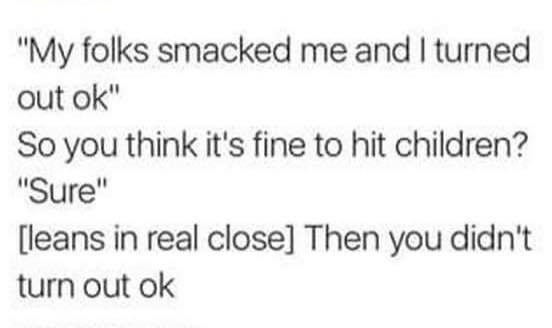There’s no excuse for abuse

“My parents hit me and I turned out ok.”
Possibilities:
- you are lying to yourself about how “ok” you turned out.
- You’ve settled for just ok instead of turning out amazingly.
- You turned out amazingly IN SPITE of abuse, not because of it; you had resources that helped you be resilient and bounce back.
If you turned out more than just ok, it’s not because of the abuse, it’s because of everything else. Kind relatives, close friends, safe escapes, imaginary worlds, art, music, dancing, singing, nature, spirituality, MANY THINGS CONSPIRED AND WORKED VERY HARD TO PROTECT YOU FROM AS MUCH DEVELOPMENTAL DAMAGE AS POSSIBLE. Don’t ever forget that. Don’t take it for granted and, above all else, don’t use it as an excuse to continue abuse. Violence does not teach others anything but shame and self hatred.
All it takes is one abusive event and a child will know that it’s “on the table” and could very well live in fear of their primary caregiver for the rest of their developmental years (and/or life). If you have created this dynamic there is room for repair. You can still talk about it and say, “Remember when _____ happened? Well I think even if I’m angry or you do something naughty, it’s not ok to hit and I’m sorry. How about both help each other to never hit anyone ok? Because we don’t want to make anyone feel scared or sad like that. Can you forgive me? Can I have a hug?”
And perhaps later in life there is room for a discussion about anger/violence, punitive versus protective use of force and that why martial arts can be a very good discipline. To determine it’s absolutely necessary and know how to establish safety is different from the desire to “teach someone a lesson.” The real lessons are when violence could have been used but the situation was handled without it.
There is no current evidence to support physical punishment as an effective teaching or child raising method. Speaking as someone who cares for individuals as a profession - abused children will sometimes misbehave and act out but a less commonly known symptom is that they often appear well behaved because they don’t demonstrate any symptoms that are inconveniencing us. Many abusers think they have good kids and say things like “I don’t know how they turned out ok with a parent like me, must be God’s mercy.” In reality, their “good kids” may have severe depression, negative self talk, suicidal ideation, and many other silent symptoms because punishment has taught them to keep quiet and behave. This often happens with (but is not limited to) abusive narcissistic parents who think anything that doesn’t directly irritate them doesn’t matter and needs no attention.
Hitting kids is not developmentally aware. People who have been hit as children will be inclined to defend their parents and their own identity because to admit that it is not ok opens up a giant can of worms that requires quite a lot of vulnerability and bravery to sift through. Of course I want to say I turned out great no matter how I was raised because the only alternative is to say “I did not turn out great,” and who wants to admit that!!? Of course I want to say “my parents did a fine job,” because I don’t want dishonor or disrespect them.
It’s that type of rigid black and white thinking that physical punishment creates. “I must be all bad or all good. I must behave correctly or I will have pain inflicted upon me. My parents did the best they could or they were sadists.” There is no in-between after a punitive paradigm is set.
You can survive it, but survival has nothing to do with what brings about healthy human development and good character traits. The other side of passing in society with correct behavior is the anxiety and panic that stems from looming abusive paradigms and conditioned fear responses; to build a character according to punishments instead of a desire for empathy and connection with others.
Punitive punishment is not a way to prevent your children from being to sheltered. It’s not a parent’s job to be violent in order to demonstrate the world is violent. It’s a parent’s job to be nonviolent and collaboratively look at violence with their children and have rational discussions about what it is and the various ways we can manage it. In this way, you are demonstrating safety is possible. With a punitive punishment paradigm you demonstrate safety is impossible because not even their primary caregiver can provide it (neglect), or worse, they actually are the ones creating the unsafe environment (physical abuse). The environment you create shapes the entire lifespan of your offspring. Make it a reliably safe one. There is no greater power in the world than believing safety is possible and that you have it. It’s only from feeling unsafe that a child misbehaves in violent ways. Violence is a lack of options for safety.
This happens to me also......